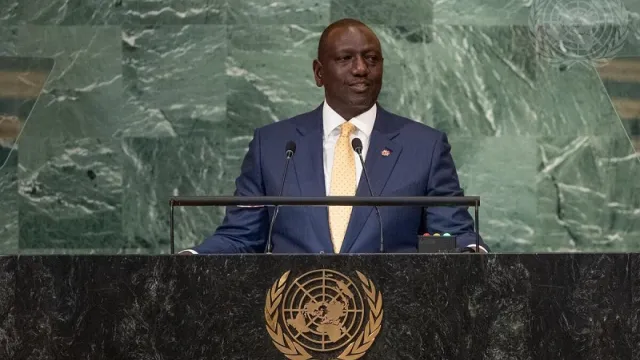Kenya on course to a plastic-free environment — President Ruto

Kenya on course to a plastic-free environment — President Ruto
President William Ruto has pledged to end plastic pollution in Kenya, which has for the longest time posed a major threat to humans and the environment.
During his inaugural speech at the United Nations General Assembly (UNGA) in New York on Wednesday, Dr Ruto said Kenya is ready to work with other nations to achieve the goal.
"Kenya is committed to working with other nations to pursue legally binding instruments aimed at bringing an end to plastic pollution,” he said.
“As the host nation to UNEP and the UN-Habitat, Kenya affirms that these critical UN agencies have an indispensable role in the promotion of environmental sustainability globally as well as developing socially and environmentally sound and sustainable cities,” he added.
He urged all UN member states to deliver the commitments they made towards climate change financing before the Climate Change Conference (COP 27) in November, pointing out that the accomplishment of pending actions by the member states is essential for the implementation of climatic frameworks.
In August, the Kenya Plastics Pact published a roadmap to ensure all plastic packaging in the country is recyclable or reusable by 2030, an initiative that was endorsed by over 30 business entities.
Read also: Inflation adjustment by KRA is simply a double tax on consumers
Ms Karin Boomsma, the Pact’s Secretariat Lead said “The Kenya Plastics Pact Roadmap reflects a powerful voice for tangible change by 2030 and will guide and mobilize the industry to tackle plastic pollution by taking collective action. The Roadmap activities are elaborate and based on Kenya’s context and the current situation in the country in terms of waste management, plastic pollution, the economy, the policy landscape, and available infrastructure.”
Last week ClimeCo, a US company and Greek organization Enaleia entered into a deal that is geared towards fighting against plastic pollution in Kenya.
The initiative supports Kenyan fishermen by providing them with the means to collect discarded nets, gear, and marine litter.
“Considering that about 20 percent of ocean plastic is lost fishing gear, by empowering fishing communities at this scale, we can not only clean up significant amounts of plastic but also prevent further plastic pollution of the oceans,” explains Lefteris Arapakis, Enaleia’s co-founder and director.
ClimeCo’s funding, combined with the sale of the credits, will thus improve the efficiency of Enaleia, which now plans to collect between 1,000 and 3,000 tonnes of plastic waste per year from Kenya’s coastline. This will help reduce marine pollution, with a positive impact on aquatic biodiversity and fisheries.
Currently, an estimated 22,000 tonnes of waste are generated in Kenya per day, about 20 percent of it is plastic, according to National Environment Management Authority (NEMA). Kenya’s daily plastic consumption is estimated to be 0.03 kg per person.
Available data also shows that the full amount of plastic that becomes waste in Kenya is approximately 0.5 to 1.3 million tonnes per year, out of which, only eight percent is recycled.
In 2018, Kenya implemented what was considered one of the harshest plastic bag bans, with high fees or prison sentences for non-compliance.
In 2020, Kenya banned the use of all single-use plastics (SUPs) in all protected areas and developed a complementary implementation plan, including outreach campaigns and financial disincentives (such as fees) on SUPs.



